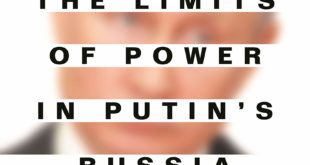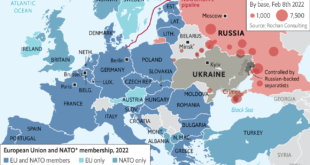Now, those prophesizing war have a point. If you take civil conflict from recent history, you find a chillingly familiar list of initial conditions: politics hardening along identity lines; a surge of armed groups; an erosion of institutions. Ethnic polarization and democratic backsliding are especially persistent predictors of state collapse. But apply this to the United States with care. The data driving these results comes from predicting massive acts of violence – genocide or...
Read More »Why I think the west should support Ukraine big time, but also why we shouldn’t ignore the risks
That is my op-ed today in the L.A. Times. I really do think the ruin of war is a useful lens to look at conflict. It also helps us see how this conflict might end, why it might end faster if NATO is unconditional in its support for Ukraine, and why I think that stance is worth the great risks it entails. First, the rest of the op-ed:Even Vladimir Putin, author of the world-changing conflict in Ukraine, tried to avoid war in his own insidious way. For two decades, he employed every underhanded...
Read More »Managing the academic job market
What follows is a summary of what I see as the key advice, with links to other resources that go into more depth or do a better job than I can. It’s going to be most accurate for economics, political science, public policy & other professional schools This post is a continuous work in progress, and it is comes not only from my own experience but that of a huge number of colleagues and readers. It can benefit from your feedback too, so please email me if a you have something to add (or if...
Read More »Putin the weak strongman
Putin-centered approaches to Russian politics also assume that President Putin can easily turn his preferences into policy outcomes. To be sure, Putin is the central node in Russian politics, has faced no serious political challenger since returning to the presidency in 2012, and can often pass legislation with few amendments in Parliament, but he also confronts the physical limits of ruling Russia and challenge of governing a modern society. He must rely on close advisers who in turn...
Read More »Putin the weak strongman
Putin-centered approaches to Russian politics also assume that President Putin can easily turn his preferences into policy outcomes. To be sure, Putin is the central node in Russian politics, has faced no serious political challenger since returning to the presidency in 2012, and can often pass legislation with few amendments in Parliament, but he also confronts the physical limits of ruling Russia and challenge of governing a modern society. He must rely on close advisers who in turn...
Read More »Up with international relations theory, down with the -isms, and down with the certainty
Putin’s invasion of Ukraine has rekindled another, potentially more bitter conflict: the long-running war between international relations school of thought. You may have read the Mearshimer interview in the New Yorker that roiled so many, defending his version of realism. Maybe you read Stathis Kalyvas’ defense of constructivism. Or one of a thousand tweets, raging against or loving an IR take. If you’re like most people, however, you’re just confused. If so, forgive yourself. I spent years...
Read More »When we focus on Russian aggression and motives, are we asking the wrong questions?
Here’s a thought experiment I think it’s useful to perform. Start by assuming that Ukrainians and NATO could make invasion painful for Russia, but that Russia has the military forces to overwhelm Ukraine, the foreign reserves to survive sanctions, and the resolve to invade despite these costs and risks, should Putin not get what he wants. If you take these assumptions as true, then I think you’re forced to conclude that there will be peace if Ukraine and NATO more or less capitulates, and...
Read More »Computer viruses don’t come with a return address
Is a renegade American responsible for shutting down much of North Korea’s internet? Just over a year ago, an independent hacker who goes by the handle P4x was himself hacked by North Korean spies. P4x was just one victim of a hacking campaign that targeted Western security researchers with the apparent aim of stealing their hacking tools and details about software vulnerabilities. He says he managed to prevent those hackers from swiping anything of value from him. But he nonetheless felt...
Read More »Why I do not expect a civil war in America (and what does worry me)
It began a few years ago, when prominent democracy rating organizations started downgrading the United States, putting its institutions on par with Panama, Argentina, or Romania. In retrospect, that seems like the good news. Last year, the international security and intelligence expert Greg Treverton predicted the breakup of the union in a piece titled Civil War Is Coming. And early this year, in a book titled The Next Civil War, journalist Stephen Marche outlined America’s many future...
Read More »Best nonfiction I read this year, Part II
Continuing from last week, a few more favorites of the past 12 months (none of which were written all that recently). And a reminder that you can sign up to get posts by email. Gods of the Upper Air, by Charles King, alongside Euphoria, by Lily King (and Gillian Tett’s Anthrovision for good measure) Euphoria was my recommendation for best book in 2015. “Pioneering anthropologists in the field, making it up as they go along: The novel,” was my description. It was a thinly-veiled...
Read More » Heterodox
Heterodox



